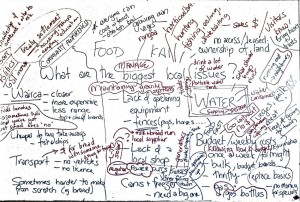According to the United Nations, food is a basic human right. Article 25(1) of the Universal Declaration of Human Rights states that ‘Everyone has the right to a standard of living adequate for the health and well-being of himself and of his family, including food…” Understanding more about what is happening for whānau will inform initiatives that ensure their right to food is upheld.
In 2010 I assisted Hawke’s Bay District Health Board (DHB) with a scoping project on food security. Food security is defined by the World Health Organization (WHO) as being about:
- Food availability: sufficient quantities of food available on a consistent basis.
- Food access: having sufficient resources to obtain appropriate foods for a nutritious diet.
- Food use: appropriate use based on knowledge of basic nutrition and care, as well as adequate water and sanitation.
Tracy Ashworth, a Health Promotion Advisor at the DHB, had been talking with people living in local cities about how they were doing with ensuring their families had enough to eat. The two of us we went out to Raupunga and Mahia to find out how whānau were doing in more rural locations. Two hui were held to ask whānau about their food security.
The first question whānau were asked was ‘What are the biggest local issues?’ about kai (food). This was written in the centre of a large white board at the front of the room.
Participants were asked to discuss this question in small groups (2-3 people) and then come back to the large group to contribute their thoughts. As they spoke I wrote their ideas on the white board.
Once the issues had been canvassed whānau were asked how their community worked together to address the issues. Participants were also asked about solutions:
- What would make the most difference now – short-term solutions?
- What could be some of the long-term solutions?
It shouldn’t be surprising that some of the biggest local issues were about things that those living in towns and cities take for granted: water, power, having local supermarkets, and paying reasonable prices. Good short-term and long-term solutions were proposed.
‘Manage’ was written on the whiteboard in response to the discussion in Raupunga. Whānau did just that, they managed. They talked about these potentially very stressful circumstances not placing enormous stress on them as they were so used to managing the water, the power, the travelling for food, etc. on a day-to-day basis. The knowledge of how to do this was present in the community and if someone got into difficultly there was the impression that their neighbours could and would help them out.
This is one time of the year that is particularly testing of the ability of whānau to manage. With our research hat on, the food security project is a timely reminder about just getting out there and asking people what’s going on for them and what would help them. With our whānau hat on this project may also prompt us to check in with our neighbours to see if they have enough kai (food) in their cupboards, and how we might be part of a community that shares and helps our neighbours manage.

